Practice the AP 7th Class Science Bits with Answers Chapter 17 Changes Around Us on a regular basis so that you can attempt exams with utmost confidence.
AP State Syllabus 7th Class Science Bits 17th Lesson Changes Around Us with Answers
Choose the correct answer.
Question 1.
Rust is
A) Iron
B) Oxygen
C) Water
D) Iron Oxide
Answer:
D) Iron Oxide
Question 2.
Depositing one metal on another metal is
A) Physical change
B) Rusting
C) Galvanisation
D) None
Answer:
C) Galvanisation
![]()
Question 3.
This metal is generally used for Galvanisation.
A) Magnesium
B) Zinc
C) Iron
D) Aluminium
Answer:
B) Zinc
Question 4.
……………… prevents the outer surface of potato from colouring.
A) Grease
B) Paint
C) Cold water
D) Zinc
Answer:
C) Cold water
Question 5.
Ascorbic acid is
A) Vitamin A
B) Vitamin B
C) Vitamin D
D) Vitamin C
Answer:
D) Vitamin C
Question 6.
Magnesium Hydroxide is
A) Acidic
B) Salt
C) Basic
D) Neutral
Answer:
C) Basic
![]()
Question 7.
Lime water changes to milky is a
A) Physical change
B) Chemical change
C) Slow change
D) Speed change
Answer:
B) Chemical change
Question 8.
Ripening of fruits is a
A) Chemical change
B) Physical change
C) Natural change
D) All the above
Answer:
A) Chemical change
Question 9.
Action of heat on paraffin wax is
A) permanent
B) physical change
C) chemical change
D) none of the above
Answer:
B) physical change
Question 10.
In a physical change
A) change in composition
B) energy is released
C) energy is absorbed
D) no change in composition
Answer:
D) no change in composition
![]()
Question 11.
Burning of sulphur in air is
A) physical change
B) temporary change
C) chemical change
D) not possible
Answer:
C) chemical change
Question 12.
The colour of magnesium oxide is
A) Red
B) White
C) Yellow
D) Green
Answer:
B) White
Question 13.
Rusting of iron is
A) chemical change
B) temporary change
C) physical change
D) not possible
Answer:
A) chemical change
Question 14.
Physical change is
A) permanent
B) temporary
C) both A & B
D) none
Answer:
B) temporary
![]()
Question 15.
Melting of wax is
A) physical change
B) chemical change
C) both A & B
D) none
Answer:
A) physical change
Question 16.
The chemical name of lime is
A) calcium
B) calcium oxide
C) calcium hydroxide
D) calcium hydride
Answer:
C) calcium hydroxide
Question 17.
Gas absorbed by white wash on the wall is
A) oxygen
B) carbondioixide
C) carbon monoxide
D) none
Answer:
B) carbondioixide
Question 18.
S + O2
A) So
B) S2O
C) SO4
D) SO2
Answer:
D) SO2
![]()
Question 19.
Through this image we can understand that
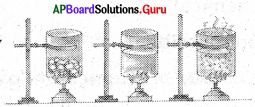
A) water can available in 3 states.
B) on heating ice turns into water.
C) water can change its state from one to another.
D) All of these
Answer:
D) All of these
Question 20.
The experiment in this image can write as following equation
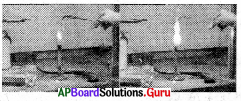
A) vinegar + baking soda → carbondioxide + other substances
B) copper sulphate + iron → iron sulphate + copper
C) magnesium + oxygen → megnesium oxide
D) magnesium oxide + water → magnesium hydroxide
Answer:
C) magnesium + oxygen → megnesium oxide
Question 21.
In this experiment nail turns into

A) blue colour
B) green colour
C) brown colour
D) white colour
Answer:
C) brown colour
![]()
Question 22.
In this experiment the colour of water turns as follows
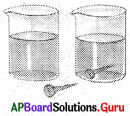
A) From blue to green
B) From green to blue
C) From blue to brown
D) From green to red
Answer:
A) From blue to green
Question 23.
In this experiment which gas is produced
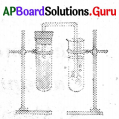
A) oxygen
B) carbondioxide
C) hydrogen
D) nitrogen
Answer:
B) carbondioxide
Question 24.
In this experiment what are the liquids in the first, and second test tubes?
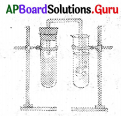
A) Acid and Base
B) Base and Acid
C) Acid and Acid
D) Base and Base
Answer:
A) Acid and Base
![]()
Question 25.
In this picture what changes do you observe?

A) Chemical change
B) Permanent change
C) Both A & B
D) Physical change
Answer:
C) Both A & B
Question 26.
What is the experiment in this diagram?

A) Crystallization
B) Galvanisation
C) Corrosion
D) Rust
Answer:
A) Crystallization
Question 27.
In the physical change, change occurs in
A) shape of substance
B) size of substance
C) colour of substance
D) all of these
Answer:
D) all of these
Question 28.
In which change new substance is formed
A) Physical
B) Chemical
C) Biological
D) Both A & B
Answer:
B) Chemical
![]()
Question 29.
In a change the following may be produce
A) light
B) heat
C) sound
D) all of these
Answer:
D) all of these
Question 30.
Through crystallization we can separate
A) a soluble solid from the solution.
B) an insoluble solid from the solution.
C) a soluble liquid from the solution.
D) an insoluble liquid from the solution.
Answer:
A) a soluble solid from the solution.
Question 31.
In the Galvanisation process which metal is used for depositing on iron.
A) Copper
B) Gold
C) Mercury
D) Zinc
Answer:
D) Zinc
Question 32.
Ice melts in to water, it is a
A) physical change
B) Reversible change
C) Slow change
D) All of these
Answer:
D) All of these
![]()
Question 33.
The end product of this experiment

A) Zinc oxide
B) Copper sulphate
C) Magnesium oxide
D) Magnesium hydroxide
Answer:
D) Magnesium hydroxide
Question 34.
The liquid taken in this beaker is
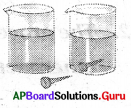
A) Copper sulphate
B) Magnesium oxide
C) Vinegar
D) Lime water
Answer:
A) Copper sulphate
Question 35.
When turmeric is added with lime water it turns into colour
A) yellow colour
B) white colour
C) red colour
D) green colour
Answer:
C) red colour
![]()
Question 36.
The rust is chemically
A) Magnesium oxide
B) Iron oxide
C) Zinc oxide
D) Calcium oxide
Answer:
B) Iron oxide
Question 37.
Which substance is responsible for rusting?
A) Air
B) Water
C) Colour
D) Gas
Answer:
B) Water
Question 38.
Through galvanisation we can protect
A) Iron
B) Zinc
C) Copper
D) Gold
Answer:
A) Iron
Question 39.
When your mother cuts the brinjals, it turns into brownish. To avoid this we should
A) Put into salt water
B) Put into lemon water
C) Vinegar mixed water
D) All of the above
Answer:
D) All of the above
![]()
Question 40.
The process of depositing a metal on other metal is called
A) Chlorination
B) Galvanisation
C) Oxidation
D) Ventilation
Answer:
B) Galvanisation
Question 41.
Which of these substances is formed when we burn Magnesium ribbon?
A) Magnesium Oxide
B) Magnesium Chloride
C) Magnesium Sulphate
D) Mangenese Oxide
Answer:
A) Magnesium Oxide
Question 42.
Carbon dioxide + Lime water → ________ + Water.
A) Calcium carbonate
B) Calcium chloride
C) Carbon chloride
D) Carbon monoxide
Answer:
A) Calcium carbonate
![]()
Question 43.
The process of depositing zinc metal on iron is called ________
A) Crystallization
B) Galvanisation
C) Sublimation
D) Rusting
Answer:
B) Galvanisation